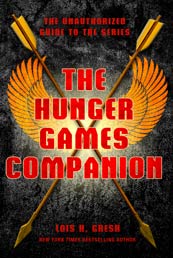2018 School Spending Survey Report

Find more great Horn Book content at these links:
Recommended books: reviews and themed booklists
App and e-book reviews
Movie reviews
Event news and recaps
Events calendar
Food for thought
In a few short months, you're bound to hear the sound of thousands of teenage girls stripping posters of Twilight franchise stars Robert Pattinson and Taylor Lautner from their bedroom walls in favor of Josh Hutcherson and Liam Hemsworth.
 In a few short months, you're bound to hear the sound of thousands of teenage girls stripping posters of Twilight franchise stars Robert Pattinson and Taylor Lautner from their bedroom walls in favor of Josh Hutcherson and Liam Hemsworth. Don't recognize the latter names? You will. Hutcherson (The Kids Are All Right) and Hemsworth (of I'm-dating-Miley-Cyrus fame) are the heartthrobs portraying Peeta and Gale, Katniss’s love interests, in the highly anticipated film adaptation of Suzanne Collins's The Hunger Games. New York Times–bestselling author Lois H. Gresh (The Twilight Companion) has also turned her attention to The Hunger Games trilogy. Her new unauthorized guide, The Hunger Games Companion, is out this month (St. Martin’s Griffin).
In a few short months, you're bound to hear the sound of thousands of teenage girls stripping posters of Twilight franchise stars Robert Pattinson and Taylor Lautner from their bedroom walls in favor of Josh Hutcherson and Liam Hemsworth. Don't recognize the latter names? You will. Hutcherson (The Kids Are All Right) and Hemsworth (of I'm-dating-Miley-Cyrus fame) are the heartthrobs portraying Peeta and Gale, Katniss’s love interests, in the highly anticipated film adaptation of Suzanne Collins's The Hunger Games. New York Times–bestselling author Lois H. Gresh (The Twilight Companion) has also turned her attention to The Hunger Games trilogy. Her new unauthorized guide, The Hunger Games Companion, is out this month (St. Martin’s Griffin).Gresh shies away from the series's romantic story lines, focusing instead on the dark, dystopian aspects of the books. Toward the beginning of The Hunger Games Companion, Gresh writes: "The reader can't help but wonder if our society is heading toward the same problems depicted in the world of The Hunger Games." Gresh draws parallels between the novels and the current financial crisis and America's materialism, as well as post-9/11 torture methods, invasions of privacy, and decreases in civil liberties. Historical "Doomsday Predictions" sidebars are scattered throughout the text; an appendix offers various end-of-the-world scenarios. While Gresh does give some insight (most notably in her chapter on medicine and poison), it feels as though her primary aim is not to analyze and supplement the books but rather to incite fear of the future in her readers.
The Hunger Games and its sequels are certainly disturbing; I avoided reading them for years, worried that I would be as thoroughly distressed as I was while reading Lord of the Flies. (Curiously, though Gresh discusses several dystopian classics like Fahrenheit 451 and 1984, she does not mention Lord of the Flies—not even in the chapter entitled “Killer Kids: How Responsible Are They?”) But Collins's trilogy is not just a fictitious warning of what the world could become or a tragic account of a political system run amok. The Hunger Games trilogy is also a story of love, loyalty, friendship, and courage. It's a shame that Gresh gives little thought to the series's poignant moments of humanity.
RECOMMENDED
ALREADY A SUBSCRIBER? LOG IN
We are currently offering this content for free. Sign up now to activate your personal profile, where you can save articles for future viewing.







Add Comment :-
Comment Policy:
Comment should not be empty !!!
Janet
I bought the Hunger Games Companion yesterday and I highly recommend it. The topics that are discussed in Gresh's book are fascinating and thought provoking.Posted : Nov 09, 2011 04:51